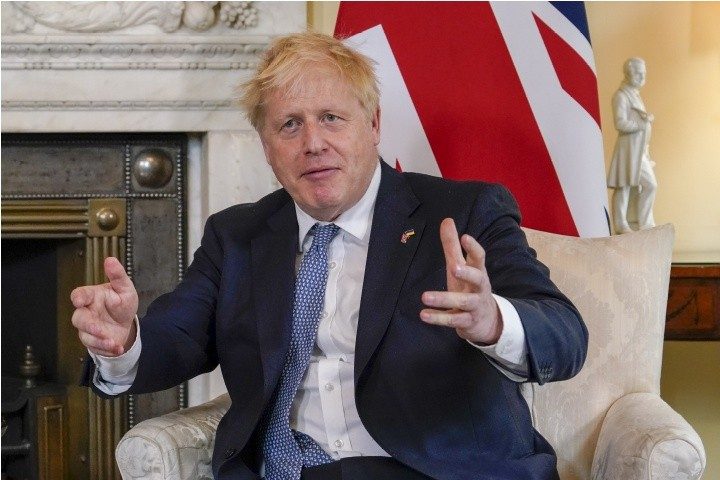
U.K. Prime Minister Boris Johnson survived a no-confidence brought by members of his own Conservative (Tory) Party. Despite his scandal-filled first six months of 2022, Tories voted to retain the prime minister by a vote of 211-148. Fifteen percent of Conservatives were required to trigger the in-party vote.
The victory means that Johnson cannot be challenged again by Conservatives for one year.
While more than 58 percent of Tories voted for Johnson, it’s noteworthy that more than 41 percent of his own party voted for the no-confidence measure. His predecessor, Theresa May, survived a similar no-confidence vote called for by the Conservative Party’s 1922 Committee in 2018, garnering 63 percent of the vote. May only survived another five months, raising questions as to whether Johnson can long survive.
Johnson took over as prime minister after May resigned in July of 2019 after she failed in numerous attempts to secure a deal for Brexit with the European Union. Johnson eventually forged a deal, which allowed the U.K. to leave the EU for good in January of 2020.
But this year has been a different story, with the now-infamous Sue Gray report shedding light on stories of Johnson and several of his aides participating in gatherings that ran afoul of the strict Covid-19 rules that his administration forced on everyday British citizens. The British press dubbed the scandal “Partygate.”
Johnson and several others, including Treasury Chief Rishi Sunak and Johnson’s wife Carrie Johnson, were found guilty of attending several 2020 “bring your own booze” parties at Whitehall, where many of the British government offices are located, and Johnson’s residence at Number 10 Downing Street. Johnson and the others found guilty where fines of £50 (approximately $63) per incident were levied.
Johnson paid the fines and offered a “wholehearted” apology even as many in Great Britain called for him to resign over the incident.
Johnson called the vote a “decisive result.”
“I think it’s an extremely good, positive, conclusive, decisive result which enables us to move on, to unite and to focus on delivery [of services],” the prime minister told Sky News.
But many in British politics — including many in his own party — believe that the scandal should necessarily result in Johnson’s resignation as prime minister.
Former top aide Jesse Norman made public a memo he wrote to the prime minister lamenting the fact that after 15 years of giving loyal support for Johnson, including his time as Mayor of London, he “can no longer do so.”
“I have always been deeply committed to public service,” Norman wrote. “But recent events have served to clarify the position this country is in under your leadership, beyond any doubt; and I am afraid I can see no circumstances in which I could serve in a government led by you.”
“People are crying out for good government,” Norman went on. “Neither the Conservative Party nor this country can afford to squander the next two years adrift and distracted by endless debate about you and your leadership.”
And, of course, the loyal opposition, which had no role in this particular vote, hoped for a different outcome. Before today’s vote, the Labour Party’s leader, Keir Starmer, urged Tories to remove Johnson from office.
“I think they’ve got to show some leadership and vote against the Prime Minister,” Starmer told LBC Radio. Starmer added that removing Johnson would be in the “national interest.”
“The public have made their mind up about this man. They don’t think he’s telling the truth, about not just Partygate, but many, many things,” Starmer said.
Of course, Johnson had his defenders. Cabinet Minister Michael Gove, who has been a close ally of Johnson’s, made it clear that he intended to vote for Boris.
“I’ll be voting for Boris this evening. The PM got the big decisions right on Brexit and Covid. We need to focus now on defending Ukraine, driving levelling-up and generating growth. We need to move past this moment and unite behind Boris to meet these challenges,” Gove tweeted.
Johnson may have won this round, but May won her own Troy no-confidence vote by a wider margin and was still out of office a mere five months later. Johnson no longer has the trust and confidence of many Tory MPs or their voters, and as Labour’s Starmer has noted, this may be “the beginning of the end,” of Johnson’s run as prime minister.




